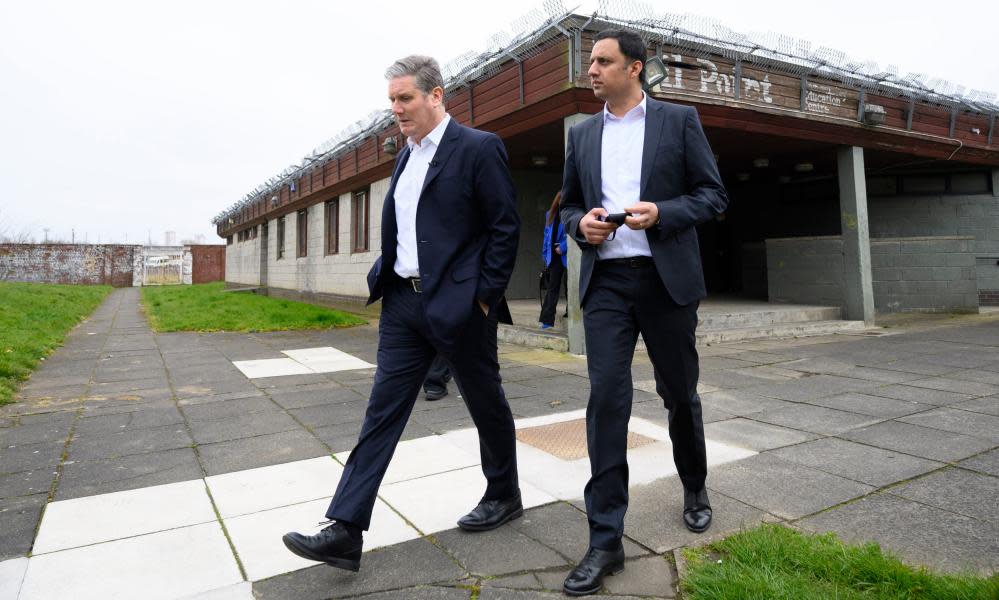I’ll never talk to the SNP, says Starmer. That’s morally dubious and tactically inept

What is politics about if not about talking? Politics is about the formation of shifting alliances in the country, across different voter groups and sectors, between parties and within parties. At its best, politics is agile, inquiring, empathic, humble and bold.
But not according to Labour’s leadership, which is on Monday expected to confirm its strategy of never talking to the SNP, a move that is morally dubious and tactically inept.
It’s morally questionable because we still, just, live in something called a democracy. And in a democracy, if the SNP keeps winning majorities in Holyrood and returning the vast majority of Scotland’s MPs to Westminster, then it has a legitimate mandate for a second referendum – that at least has to be engaged with. To deny not just the mandate or the party but the people of Scotland, who voted for them, is to deny democracy as a process of negotiation. Instead, it to practise politics as coercion.
Saying to the SNP, and especially its voters, “We will stare you down and give you no option but to back us, or be portrayed as Tories,” is tantamount to a form of political abuse. It will turn people away from democracy just when it needs deepening.
And what goes for the SNP is likely to go for the Liberal Democrats, who will be similarly stared down over their demand for proportional representation (PR).
What it won’t do is stop the charge from the Tories that voting Labour means a coalition of chaos. Labour can chisel its SNP-shunning vow on a tablet of stone, and yet the Tories will still make the claim, because unless parties talk, it will look like chaos. It will mean night after night of acrimonious Westminster votes being battled out behind closed doors instead of a stable, open agreement to deal with the omnicrisis world we now live in.
The only answer to the chaos charge is a coalition of coherence based around some level of trusted cross-party relationships and sensible planning. The exact nature of any minority government, from full deal to confidence and supply, matters less than the intent, which must be to cooperate in the national interest beyond tribal party interest. Compass, the organisation I work for, has written a handbook for how the negotiations around a hung parliament could work, learning the lessons of other countries and cultures, such as Germany, in which this is second nature.
Related: Labour will never strike deal with SNP, Keir Starmer to pledge
The irony is that we have been here before. However much you may have hated the 2010-15 coalition, it was stable because it was talked through. The country desperately needs a radical and progressive version of that. Indeed, sensible cooperation is taking place already in Wales between Labour and Plaid Cymru, and in councils across the country where progressive parties are working together to get 80% of what they do want, not 100% of what they don’t.
The hypocritical irony is, of course, that the Tories will say and do anything to stay in power – even trying to do a deal with the SNP, just as they did with the Lib Dems and the DUP.
The perplexing tragedy in all this is that what the Tories fear most is a hung parliament that backs PR, because for them the game is then up. So why is Labour doing their bidding by running away from exactly what hurts the Tories most?
There is a raw truth: there are some at the heart of Labour who never want to see a politics of negotiation or the fair voting system that underpins it. Instead, they first want to ensure the continuation of a two-horse race that guarantees second place and remaining Her Majesty’s Opposition. They never want the system opened up to fair competition.
And they never again want to lose control of the party machine that locks in this duopoly position, as they did under Jeremy Corbyn. Hence the stories about shortlist stitch-ups. Their principal offer to the country will always be: “The Tories are worse than us, so you have no option but to back Labour.” For them, the two-party system must be enshrined, even if that means losing.
Meanwhile, the planet burns, the poor get poorer, and the drift to authoritarian populism continues apace, as the path to an open and plural politics, the only way to construct a new social, environmental and democratic settlement, is forcibly denied.
Still, to every action there is always a reaction, and everywhere people are quietly talking, exploring what they have in common and what can be achieved together. They are acknowledging what seems clear: that in the face of climate chaos, we are going to have to build a new politics in which the best possible future is negotiated, not imposed. It’s happening. The decision for Starmer’s Labour is whether to be part of it.
Neal Lawson is director of the cross-party campaign organisation Compass
Do you have an opinion on the issues raised in this article? If you would like to submit a letter of up to 250 words to be considered for publication, email it to us at observer.letters@observer.co.uk

 Yahoo Movies
Yahoo Movies 
